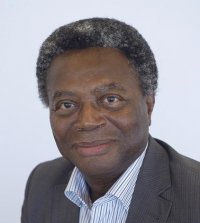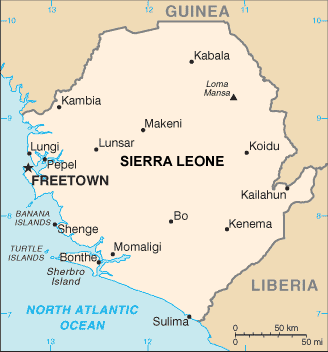Opening Remarks: Building a United and Cohesive Society
(National Consultative Conference organized by the National Commission for Democracy (20-22 March 2012, Bank Complex, Kingtom)
I would first like to thank the organizers, The National Commission for Democracy, for inviting me to chair the opening session of this important conference. (Photo: Yusuf Bangura, author and Chair or NCD conference)
Institutions like the NCD are essential in the consolidation and expansion of democracy. Such institutions can be effective and credible when they enjoy relative autonomy and are run by competent professionals with a commitment to the public good.
I commend the Chairman and staff of the NCD for raising the profile of the organization, especially in the run-up to the 2012 general elections.
This conference, which will focus on ways of building a peaceful, tolerant and cohesive nation, could not have been organized at a better time.
Sierra Leone has just conducted national elections, which, like previous elections, especially those of 1967, 1996 and 2007, revealed a highly divided electorate and lack of trust between the main political parties.
However, I should emphasize that despite our enormous problems, we have made important strides in consolidating our young democracy.
- The guns are silent and have, to a very large extent, been destroyed;
- The press enjoys remarkable freedom despite its abraisiveness and serious shortcomings in the quality of reporting;
- There are no political prisoners;
- And some of the core institutions of governance are beginning to enjoy the trust of the people despite the challenges.
It is important that the search for institutions and policies that can make us a tolerant and inclusive nation is taking place within a democratic setting. Democracy offers opportunities to identify, debate and rectify problems without resorting to violence. The best period to solve problems that require constitutional change is usually after a general election when passions have cooled and the issues that cause division, intolerance and exclusion are still fresh in the minds of voters.
I believe that this conference is part of a wider conversation that has been inspired by the President’s post-elections speech to parliament in which he called for a review of the constitution to make Sierra Leone a more inclusive and tolerant polity.
Sources of intolerance
Intolerance thrives in divided or non-cohesive societies. It has many sources and dimensions, and can express itself at various levels of society.
It may be attributed to relations of domination, which may have a long historical trajectory, in the spheres of race, ethnicity, gender and class.
These may breed feelings of superiority among dominant groups as in apartheid South Africa; the effects of slavery on White-Black relations in the USA; male superiority over women spanning centuries or millennia; and peasant and working class subordination by property owners in feudal and industrial societies.
Intolerance can also occur even when relations of domination are not clearly defined or established. This may happen because of unregulated competition over scarce resources and positions in government and the private sector.
Individuals and groups may develop a sense of entitlement or exclusion, depending on their relations with the power structure, and may perceive politics as a zero-sum game in which losers are excluded from key resources and offices and winners take everything. Again, such intolerance may assume racial, ethnic, gender or class dimensions.
From the programme, it is clear that the organizers are mainly interested in the ethnic dimensions of the problem. We should however not lose sight of these other dimensions as they may be inseparable from ethnicity. In some contexts, progress in building united and cohesive societies and overcoming intolerance in the ethnic domain may require equal attention to these other cleavages.
The ethnic problem
The first task for the policy analyst in devising mechanisms for inclusion and tolerance is to identify the key cleavage or cleavages that policy should address.
If the focus is on the ethnic cleavage, then some understanding of the distribution of ethnic groups and their interconnections is important:
- is one group overwhelmingly dominant numerically?
- is the society made up of only two or three ethnic groups?
- do two or three groups dominate in a multiethnic setting?
- is the ethnic structure fragmented in such a way that it is difficult for any group to dominate politics or form regional coalitions?
Research suggests that countries with fragmented cleavages are much easier to manage than those that are polarized.
Unfortunately, Sierra Leone’s ethnic structure tends to be polarized:
- Two dominant groups, which are roughly equal in size, account for about 60 percent of the population;
- The two groups are also geographically separated, making it possible for smaller groups in regions where each group is dominant to coalesce around the dominant group;
- The two main political parties and voting patterns tend to reflect this ethno-regional bipolarity.
One of the dangers of bipolarity is that voters may be less flexible in relating to parties that are perceived to derive their core support from other regions.
This may lead to multiple publics. Groups that lie outside of a ruling party’s stronghold may dismiss government initiatives even if the public good is served by such initiatives. Similarly, a ruling party’s voters may discredit everything that opposition parties from other regions do. Multiple publics may encourage non-cooperation between parties, and may plunge societies into conflict.
However, despite Sierra Leone’s bipolar ethnic structure, we do score very well in many other dimensions that measure tolerance:
- There is a high level of inter-ethnic marriage;
- We rank highly on religious tolerance, perhaps unsurpassed by no other country;
- There are no large scale ethnic settlements or ghettoes in the capital city;
- A lingua franca, Krio, helps to depoliticize language, which is an important marker of identity and a source of conflict in other countries;
- Our schools are not ethnically segregated;
- Food, dress and music preferences tend to be uniform across ethnicities;
- And our professional organizations are highly multi-ethnic.
It is at the political level that intolerance tends to manifest itself. However, if political intolerance is not well managed, it can easily affect other facets of society and poision relations between people in their everyday lives.
Solutions
How can united, tolerant and cohesive societies be built? There are a variety of policy and institutional mechanisms that address issues of intolerance and exclusion. They focus on two issues: inequality reduction and recognition of cultural differences.
Recognition deals with issues of language rights, religion and cultural traditions. Fortunately, we have a lingua franca, and groups do not fight over language rights as in other countries, such as Sri Lanka, Latvia and Belgium. And the holidays of our two major religions are equally observed.
The major challenge is in inequality reduction, which focuses on incomes; employment; asset ownership, such as land; and access to services; as well as the way cabinets, the civil service and law enforcement agencies, such as the military and police, are constituted.
- How representative are these institutions?
- Do groups feel excluded?
- Are the institutions inclusive enough?
Institutions and policies
There are a number of rules that can promote inclusion in public institutions.
These include:
- electoral rules, such as proportional representation; the alternative vote; the two round system; primaries; threshold rules, such as our 55% rule in determining whether there should a run-off in presidential elections, and requiring winners in presidential elections to score a certain percentage of the votes in all states or districts as in Nigeria and Kenya;
- affirmative action or positive discrimination can also be used for disadvantaged groups if inequalities are durable; if the inequalities are not sharp and deep-seated, the principle of proportionality can be used in constituting public bodies;
- constitutional provisions can also be devised to ensure that political parties are substantially multi-ethnic.
We will have the opportunity to address these issues in the substantive sessions of this conference.
Having said this, I would like to emphasize that all policies and institutions that seek to promote tolerance and inclusion should pass an accountability and development test. Not all policies that promote inclusion are effective in promoting accountability and development.
Let me give two examples.
The first is the argument over power sharing and winner-takes-all systems. Donors have been in the habit of recommending power sharing systems to countries at war or that have experienced protracted conflict. This often involves distributing cabinet posts to the contending or warring parties, with the belief that a share of power will kill the appetite for war or conflict.
However, while power sharing has helped to minimize conflict or end wars, it has not been a good instrument for promoting accountability and development.
- Those who are given power may take it as a right and not something that should be exercised on behalf of the people;
- There is often no incentive to perform, since a share of power will be guaranteed to all parties even if they lose elections;
- Voters may find it difficult to punish poor performers;
- And the country may be denied the advantages of an effective opposition that can hold the government to account.
I believe that a winner-takes-all system with constitutional guarantees for the representation of major groups or districts in the cabinet is preferable to power sharing systems in young democracies that are grappling with the problems of development. In Nigeria, which practices a winner-takes-all system, the constitution stipulates that each of the 36 states should have a cabinet minister.
The second example is the choice between the list-system of proportional representation and constituency-based electoral systems. There is no doubt that the proportional representation system promotes more diversity than first-past-the post constituency systems, as it makes it possible for smaller parties that may defend the interests of small ethnic groups to organize and gain representation in the power structure.
However, the list-PR system scores poorly on accountability.
- It gives enormous powers to party leaders, who may decide how individuals are placed on party lists.
- Besides, voters may find it difficult to throw out non-performing MPs. They can only withdraw their support from the party, but not from individual MPs. Thus, non-performing MPs that enjoy the support of the party hierarchy will be shielded from the wrath of voters.
- The system can also be abused by party leaders. This happened in 1996-7 in our parliament when the leader of the United National People’s Party expelled more than 80 percent of the party’s MPs and attempted to replace them with other party members on the List. It is important to note that by-elections are not held in list-based proportional representation systems.
I will end my opening remarks by stressing two points:
First, institution-building is a long-term project; it involves compromises and experimentation; and can be messy. There are no magic bullets.
Second, people make institutions work. The best institutions will fail if people do not believe in them or are ready to subvert them without fear of the consequences. Leaders’ commitment to the rules of the game matters a lot.
Thank you.
Yusuf Bangura
Stay with Sierra Express Media, for your trusted place in news!
© 2013, https:. All rights reserved.






